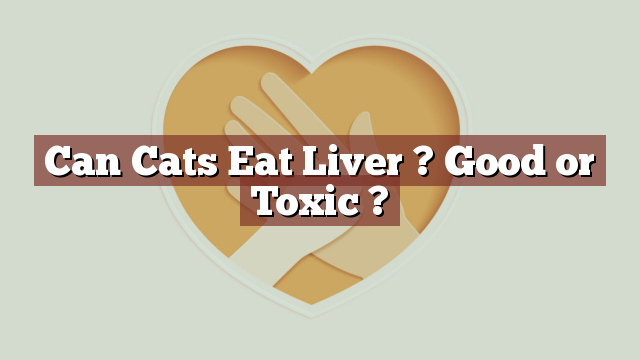Can Cats Eat Liver? Good or Toxic?
When it comes to our feline friends, it is essential to be aware of the foods that are safe for them to consume. Our pets’ health and well-being depend on a balanced diet, so understanding which foods are suitable for their consumption is crucial. One such food that often raises the question is liver. Can cats eat liver? Let’s explore the topic and find out if it is safe or toxic for our furry companions.
Nutritional Value of Liver: Vitamins, Minerals, and More
Liver is known for its high nutritional value. It is packed with essential vitamins and minerals that are beneficial for both humans and animals. Liver is an excellent source of Vitamin A, B vitamins, iron, zinc, and copper. Additionally, it contains high levels of protein, which is an essential component of a cat’s diet. These nutrients contribute to the overall health and well-being of our cats.
Can Cats Eat Liver? Safety and Toxicity Concerns
Fortunately, cats can indeed eat liver. In fact, liver is a common ingredient in many cat food formulas. However, it is important to note that moderation is key. While liver is generally safe for cats, it should not be the sole source of their diet. Cats can eat liver, but it should be offered as an occasional treat or as part of a balanced diet.
Potential Risks and Benefits of Feeding Liver to Cats
Feeding liver to cats in moderation can have various benefits. The high levels of Vitamin A in liver promote good vision and a healthy immune system in cats. The B vitamins found in liver also play a vital role in maintaining a cat’s overall health, including their nervous system and metabolism. Additionally, the iron and protein content in liver can contribute to healthy blood cell production and muscle development.
However, it is essential to be cautious when feeding liver to cats. Excessive consumption of liver can lead to vitamin A toxicity, as cats are unable to efficiently process and excrete excess amounts of this vitamin. Symptoms of vitamin A toxicity include loss of appetite, weight loss, bone abnormalities, and even joint pain. Therefore, it is crucial to feed liver to cats in moderation and avoid overfeeding.
What to Do If Your Cat Eats Liver: Signs and Actions
If your cat accidentally consumes too much liver or shows any signs of vitamin A toxicity, it is important to seek veterinary advice immediately. A professional can assess your cat’s condition and provide appropriate treatment. Additionally, ensure that your cat has access to fresh water at all times to aid in flushing out any excess nutrients from their system.
Conclusion: Moderation and Vet Guidance for Liver Feeding
In conclusion, cats can eat liver, but it should be given in moderation. Liver is a nutritious food that can provide various health benefits to our feline friends. However, it is essential to avoid overfeeding, as excessive consumption can lead to vitamin A toxicity. If you are unsure about the appropriate portion size or have any concerns, consult your veterinarian for guidance. With proper moderation and veterinary advice, liver can be a safe and nutritious addition to your cat’s diet.
Thank you for investing your time in exploring [page_title] on Can-Eat.org. Our goal is to provide readers like you with thorough and reliable information about various dietary topics. Each article, including [page_title], stems from diligent research and a passion for understanding the nuances of our food choices. We believe that knowledge is a vital step towards making informed and healthy decisions. However, while "[page_title]" sheds light on its specific topic, it's crucial to remember that everyone's body reacts differently to foods and dietary changes. What might be beneficial for one person could have different effects on another. Before you consider integrating suggestions or insights from "[page_title]" into your diet, it's always wise to consult with a nutritionist or healthcare professional. Their specialized knowledge ensures that you're making choices best suited to your individual health needs. As you navigate [page_title], be mindful of potential allergies, intolerances, or unique dietary requirements you may have. No singular article can capture the vast diversity of human health, and individualized guidance is invaluable. The content provided in [page_title] serves as a general guide. It is not, by any means, a substitute for personalized medical or nutritional advice. Your health should always be the top priority, and professional guidance is the best path forward. In your journey towards a balanced and nutritious lifestyle, we hope that [page_title] serves as a helpful stepping stone. Remember, informed decisions lead to healthier outcomes. Thank you for trusting Can-Eat.org. Continue exploring, learning, and prioritizing your health. Cheers to a well-informed and healthier future!

